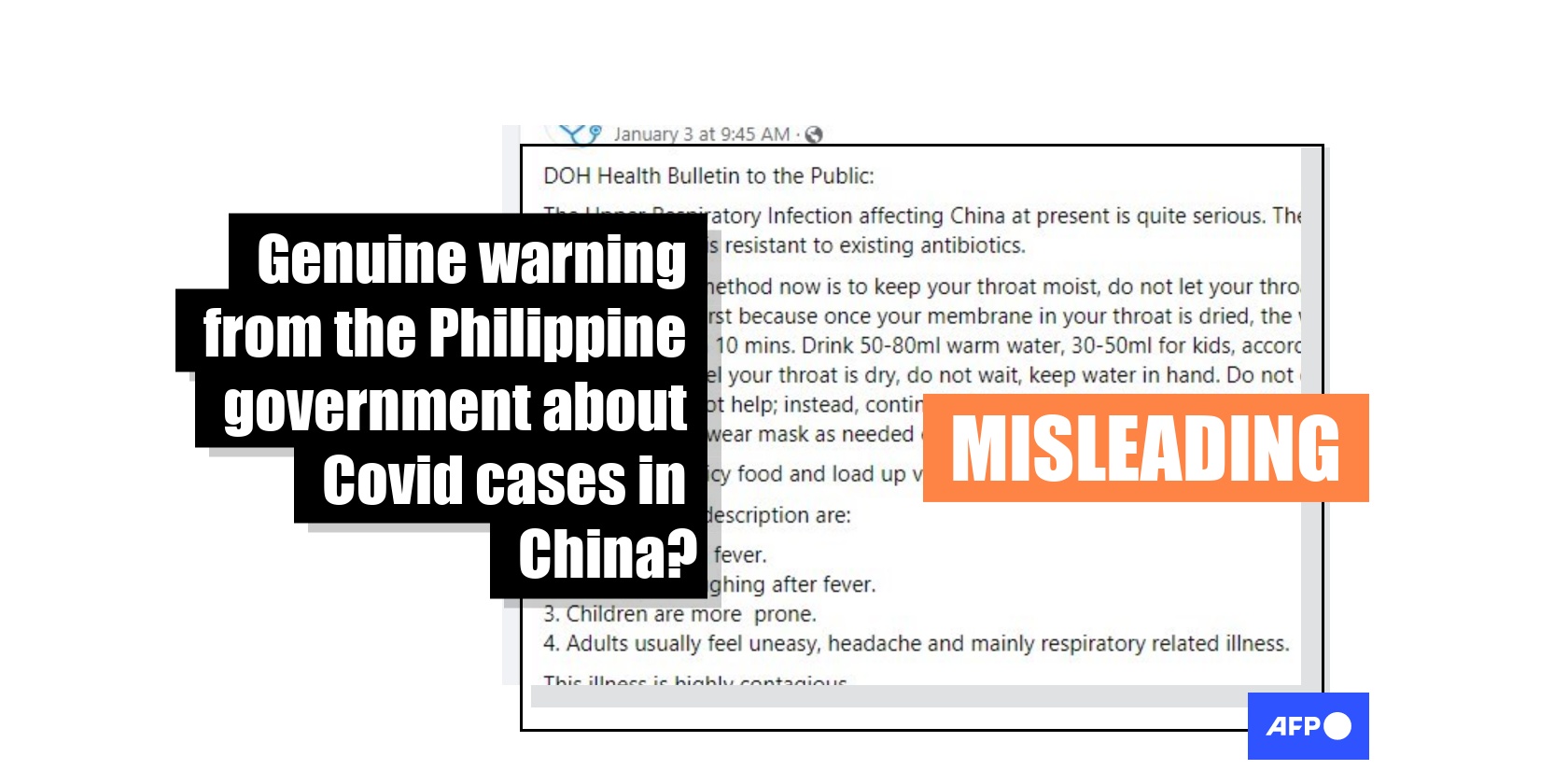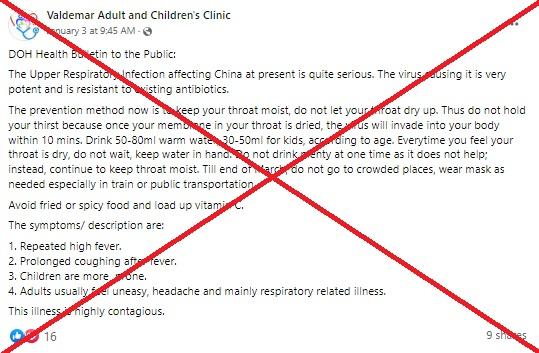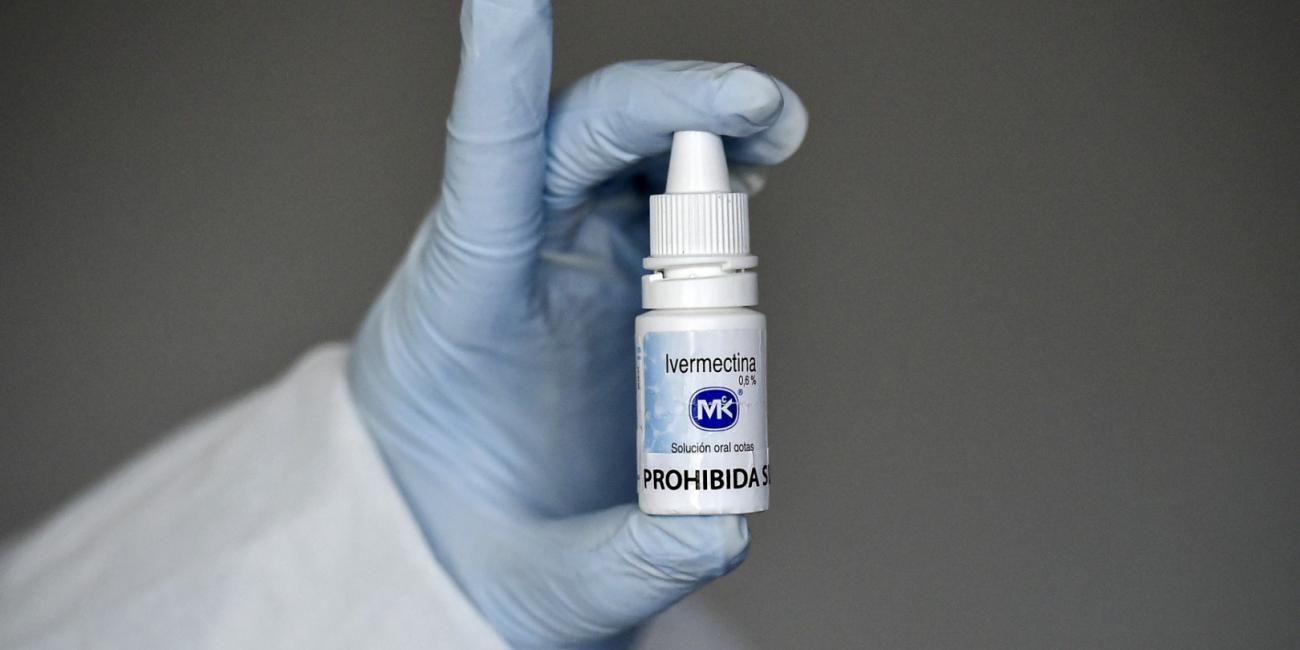
Misleading Covid info recirculates online as cases surge in China
- This article is more than three years old.
- Published on January 20, 2023 at 04:34
- 3 min read
- By Ara Eugenio, AFP Philippines
"DOH Health Bulletin to the Public: The Upper Respiratory Infection affecting China at present is quite serious," reads a post shared by a Philippines-based Facebook page on January 3, 2023. "The virus causing it is very potent and is resistant to existing antibiotics."
The post goes on to claim: "The prevention method now is to keep your throat moist, do not let your throat dry up. Thus do not hold your thirst because once your membrane in your throat is dried, the virus will invade into your body within 10 mins.
"Till end of March, do not go to crowded places, wear mask as needed especially in train or public transportation. Avoid fried or spicy food and load up vitamin C."
It also says symptoms of the infection are "repeated high fever" and "prolonged coughing after fever".
Children are "more prone" to the disease, the post adds, while adults "usually feel uneasy, headache and mainly respiratory related illness (sic)".
The posts do not specify what "upper respiratory infection" it purportedly refers to, but they circulated as Covid-19 infections surged in China as the country abruptly lifted harsh anti-pandemic restrictions in December.

Similar posts were shared on Facebook here, here and here.
However, the claim is false. Medical experts have told AFP that a dry throat does not increase the risk of virus infections.
'Keep throat moist'
Dr Rontgene Solante, an infectious diseases expert and member of the Philippine government's vaccine panel, told AFP that keeping one's throat moist is "not an accepted prevention method" against Covid-19.
"Wearing a well-fitted face mask is still one of the important non-pharmacological interventions for Covid prevention," he said in response to the misleading posts.
"The disease being resistant to antibiotics is true in the sense that Covid is a viral infection and [antibiotics don't] work against viral infection; they are active against bacteria."
Dr Thira Woratanarat, an associate professor of preventive medicine at Thailand's Chulalongkorn University, also told AFP previously on September 15, 2020: "A dry throat does not increase virus infections. Germs enter our body through cells, the respiratory tract, passing bronchia, and eventually the lungs."
"Having a dry throat doesn't increase all virus infections, including Covid-19."
The Philippine DOH published a statement on January 3, 2023 denying it issued the warning. It said the message "maliciously uses the agency's name."
A spokesperson for the World Health Organization (WHO) did not comment directly on the posts, but told AFP in an email on January 18 that "online misinformation related to health remains a challenge globally".
Similar posts here and here have in fact circulated as early as January 2020. At the time, the WHO had only learned of the new virus following a cluster of cases of "viral pneumonia" in the central Chinese city Wuhan.
AFP has not found evidence that another disease has spread widely in China.
Covid symptoms
Fever and coughing are commonly listed as Covid-19 symptoms, for example by the WHO and the US Centers for Disease Control and Prevention (CDC).
But according to the CDC, symptoms vary from person-to-person.
"Symptoms may change with new Covid-19 variants and can vary depending on vaccination status," the CDC says in its advisory here.
The agency adds in a separate advisory here that some people experience "long Covid", which can include a wide range of health problems, contrary to the post's description of the disease as a "mainly respiratory-related illness".
Besides respiratory symptoms, some patients also experience neurological symptoms such as depression, sleep problems and difficulty thinking; digestive symptoms like diarrhea and stomach pain; and other symptoms including muscle pains, rashes and changes in menstrual cycles.
Prevention and treatment
Official recommendations from the WHO -- as well as those from health authorities in the US, Canada, the UK and Australia -- do not list avoiding fried or spicy food and loading up vitamin C as Covid-19 prevention measures.
These pages have consistently said vaccination against Covid-19 protects against serious illness.
AFP also previously debunked claims of Covid-19 prevention and treatment here and here.
Copyright © AFP 2017-2026. Any commercial use of this content requires a subscription. Click here to find out more.
Is there content that you would like AFP to fact-check? Get in touch.
Contact us




